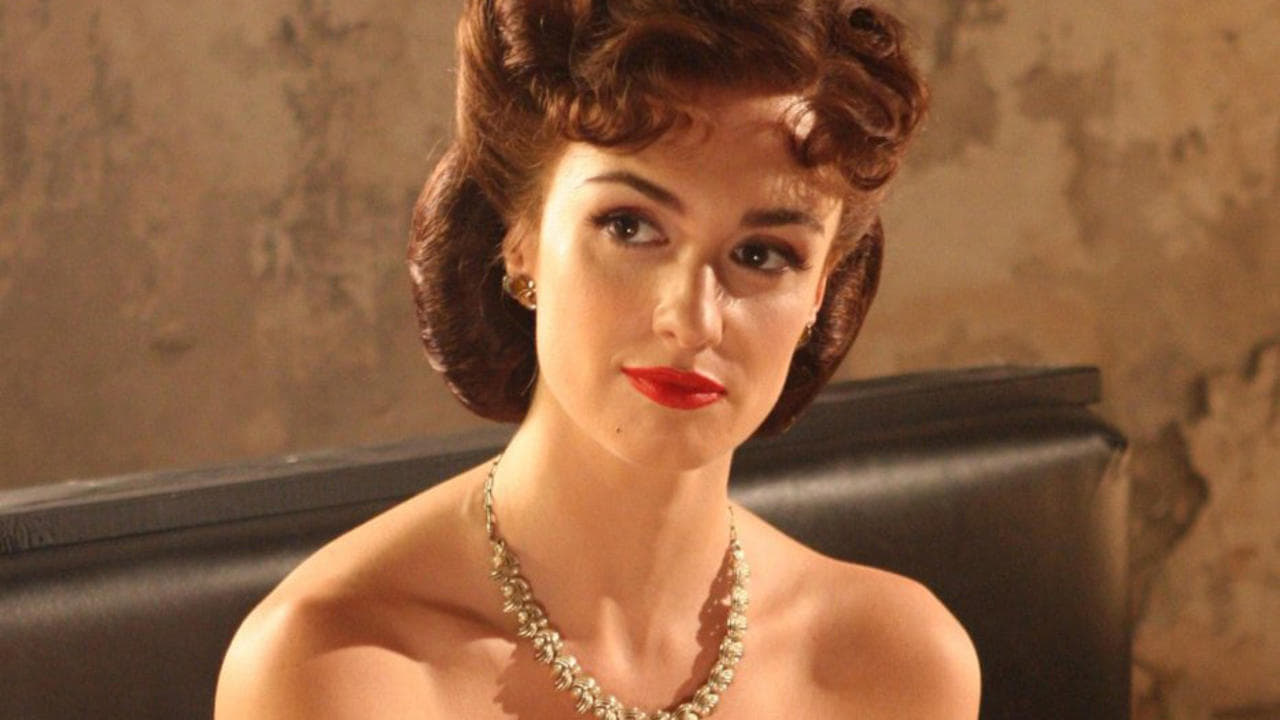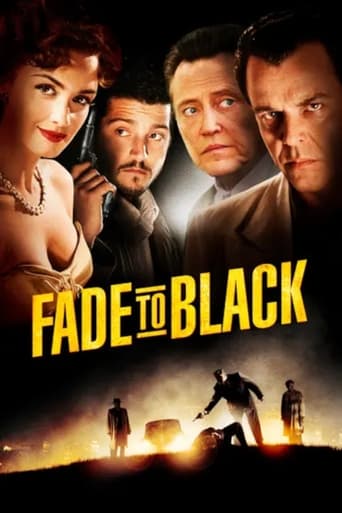



Tied for the best movie I have ever seen
Instead, you get a movie that's enjoyable enough, but leaves you feeling like it could have been much, much more.
View MoreThe film's masterful storytelling did its job. The message was clear. No need to overdo.
View MoreOne of the film's great tricks is that, for a time, you think it will go down a rabbit hole of unrealistic glorification.
View MoreI'm not sure how this was as a novel, but the film version has the classic flaw of all book adaptations. In trying to cram hundreds of pages of narrative into a couple of hours on screen, things need to be cut out. Sometimes things that are important, even vital, to the prose have to be sacrificed to the demands of cinema and other elements expanded or enhanced to take their place. Fade to Black has a great setting and a great hook but needed to severely restructure its plot in order to take full advantage of them. Any movie about genius filmmaker Orson Welles also needs to be a hell of a lot more visually imaginative than this. Those weaknesses mean that a film which starts out quite strong and has a lot of initial appeal, never manages to fulfill your expectations. Watching it is an okay experience, but also vaguely disappointing.In 1948, with his career on the down slope and his personal life in ruins, Orson Welles (Danny Huston) travels to Italy to play the bad guy in a two-bit production called Black Magic. After one of his co-stars mysteriously dies, Welles decides to investigate and finds himself caught up in the political intrigue of Italy's first post-war election and winds up a name on somebody's hit list. With the aid of his driver, Tommaso (Diego Luna), and the distracting motivation of a beautiful actress, Lea (Paz Vega), Welles discovers that reality is more twisted than any fantasy he can dream up.Fade to Black has three major strengths. Well four, if you count the presence of Paz Vega. Danny Huston is very appealing as Orson Welles. Who's to say how personally accurate the portrayal is, but Huston does a fine job at capturing the essence of a wunderkind that was no longer a kind who felt no rules applied to him and didn't handle it well when he discovered some did. The moments here that play up Welles love of filmmaking are nicely contrasted by his conflicted relish of fame and dread of celebrity. Plopping Welles down into the middle of a murder mystery is also a great idea. So is using Welles as a window into the turmoil of post-Mussolini Italy and the dawning of Cold War political manipulation.Unfortunately, combining the mystery and the political machinations proves to be too much for the film to tolerate, especially when it turns out neither has much to do with the other. Perhaps they were woven together better in the novel. Here, each vies for your attention and stunts the growth of the other. When it comes time for big developments in either the murder or the political underhandedness, it feels a bit hollow because there hasn't been the proper build up. One of them needed to be kept in the background, with the other come fully to the foreground and a subplot involving the fate of Italian Jews and an ill fated Resistance cell should have been done away with entirely. As it is, Fade to Black starts out entirely about the mystery, then becomes totally about the politics, then flips back and forth between the two until the very end.I don't want to be overly critical because I did like this movie. It came so close to being a lot better than it is, though, it's hard not to be caught up in those lamentable failings. If writer/director Oliver Parker had embraced Huston's Welles as the story's heart and soul and not felt obligated to elevate Diego Luna's Tammaso to nearly his equal, which may have been true to the Italian novel this is based upon but is nothing but false to the potential of this movie, he might have made something compelling. What he created instead was merely satisfactory. That's much better than most but in this instance, it isn't enough.
View MoreOf course this is a fictional account, and as the narrator Welles says, "if you want history read a history book." First for people who will see this film, Black Magic, while having Italian help, was really an American film, and Welles is reputed to have directed his own scenes, and if you see that film, you will be able to see his trademark. The film Black Magic, is also not that bad a movie. I had heard about this film being possibly made in the late 90's, and was surprised to see that it actually had been. The man who directed this film also had ironically directed Othello in 95. the use of Orson Welles in a thriller is something unusual. I love Orson Welles movies, and wonder if we all were cheated that he was not able to do more. I suspect that I like others are part of an Orson Welles cult following, and that is why such a film is made, with Orson Welles as a lead character. It is ironic that seven years before this film was made, Leiv Shreibner, (I probably spelled his name wrong) played a very convincing Welles, and sometimes seemed to look like him,. especially when he moved across to an elevator. I couldn't help but feel that it would have been something of a great sequel if the same actor had played Welles in this film and not Danny Huston.I don't want to suggest that Danny Huston is a failure in this film, but I think that if the film does not really grab our intention and our future memories of film, his performance in the film may be one of the reasons for that. I first remember Danny Huston in the Austrailian film The Proposition, a film in which I feel he gave an excellent performance. In this film however, I think the idea of the filmmakers, and perhaps Huston, was to portray Welles as really an everyman, not a leading figure in a movie that we would like. When he is kissing a woman in a scene, we feel that woman is only kissing him because he is someone important, not someone they find attractive. Even his co-star in the film he is about to do shows scorn for him. Everyone else in the film seems to be more of an interesting person that he is. When he meets his friend from long ago, Pete, (played by Christopher Walken, in a good performance), Walken seems more magnetic than Huston as Welles. This Welles in a clumsy, and has to be pulled out of a few situations by his Chaufeuer, and I guess body guard played by Mexican actor Diego Luna. this Welles, as someone comments towards the end of the picture does not seem important at all. Only during a scene, where Huston portrays Welles doing his magic trick, does the character of Welles really shine through, and perhaps suggests, that Welles was just another guy in this world, but through magic was able to make him on screen and on stage more magnificent than the real person. If the filmmakers had this in mind, make everyone else perhaps more interesting, I think that this was a miscalculation, and perhaps not very flattering on the life of Orson Welles. Hustons portrayal of him, does not make Welles look either interesting or likable. The film which starts out as a murder mystery, leads more to a conspiracy than just a possible murder itself. The idea is interesting, and asks some questions itself, which I won't say because it might give away to much. Though, you can see things in this film a mile away.
View MoreThis is one of those 'what if' conceits that sometimes come off spectacularly and more often than not bomb. This time around we are asked to surmise 'what if' Orson Welles couldn't get arrested in Hollywood in the late forties and in the wake of his separation and impending divorce from Rita Hayworth found himself playing the lead in a cheesy costume picture in Italy and on the side got involved in both murder and local politics. Like all 'what if's there's a modicum of truth here; Welles did exile himself in Europe in 1948 where he did appear in some fairly dire movies and, of course, he was divorced from Rita Hayworth around that time. The film has him lining up an investor for his version of Othello to be shot in Italy when the current film is in the can whereas although he did write, direct and star in Othello it was actually made in Morocco in 1952. Danny Huston really needs to do more than wield a cigar to come over as Welles and perhaps wisely he makes no attempt to reproduce that distinctive timbre though he might have had a stab at that impish twinkle in the eye that was so much a part of Welles. Pick of the rest is Anna Galieni, so great in The Hairdresser's Husband for Patrice Leconte. As a curio this is worth a look but that's about it.
View MoreI enjoyed this movie immensely. It captures the sense of Orson Welles as an adventurer, trying to raise money for movies which he understands better than those around him and instead making ones for other people which he knows are rubbish. On his travels in 1948 Italy, he stumbles into a murder mystery connected, perhaps too loosely, with a political conspiracy.It's cleverly made and very funny. I loved the playfulness which nodded at Welles's work without doing anything as crass as obvious references. It's an enjoyable story. Not a great thriller, the insights and revelations weren't surprising but that only made it more real and engrossing.Huston was encouraged to do part Orson and part his Father, John. He's a likable, believable hero matched by a good, mainly Serbian cast. Paz Vega is excellent as the heroine and Diego Luna gives a wonderful turn as the second hero to Welles, reminds me of James Macavoy, only likable.
View More